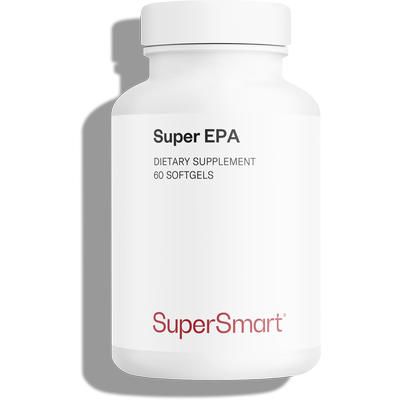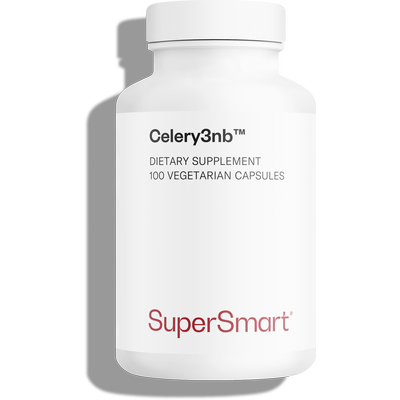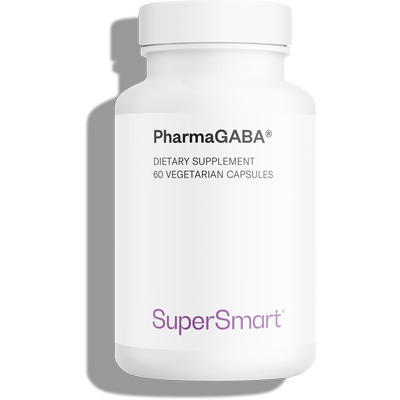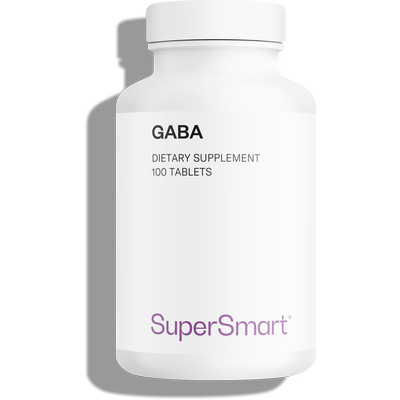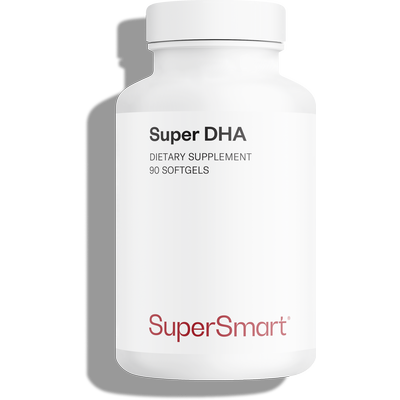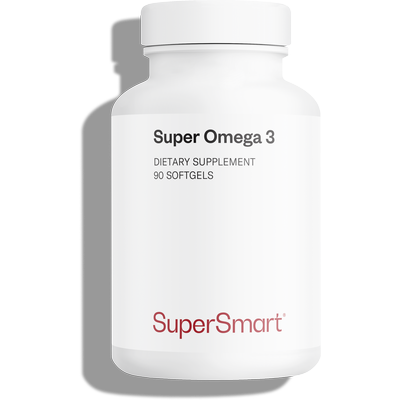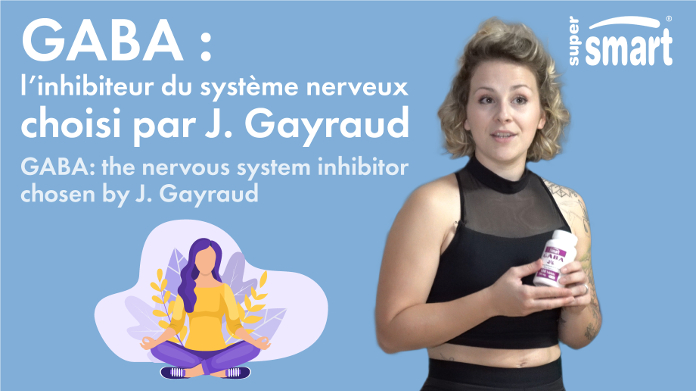GABA, effective for hypertension?
GABA is primarily known for its potential effects against depression and stress. But could it also play a role in lowering high blood pressure?

Hypertension: causes and consequences
Let’s start by defining hypertension : this chronic condition, the most common in developed countries, is characterised by abnormally high blood pressure in the arteries.
Without a medical examination, it often goes unnoticed but is nonetheless responsible for many cardiovascular, cerebrovascular or neurodegenerative complications (heart attack, stroke, etc.) (1).
What constitutes ‘normal’ blood pressure?
Blood pressure is considered normal when:
- the ‘top’ number (systolic pressure) is between 90 and 120 mmHg;
- and the ‘bottom’ number (diastolic pressure) is between 60 and 80 mmHg.
While blood pressure increases naturally with age, excess weight, a sedentary lifestyle, excessive salt consumption, alcohol and smoking are often contributing factors.
Heredity too, can play a part in the development of hypertension, as can certain diseases and medications.
We would, of course, recommend consulting a health professional if you experience an abnormal rise in blood pressure or are worried at all about your health.
Effects of GABA on hypertension
While the primary approach to combatting hypertension involves changes to diet and lifestyle (losing weight, increasing physical activity, giving up alcohol and cigarettes, eating a balanced diet, etc.), a number of studies are now investigating the anti-hypertensive effects of an amino acid called GABA.
Gamma-aminobutyric acid: a regulatory neurotransmitter
Naturally present in the body, gamma-aminobutyric acid, commonly known as GABA, is the central nervous system’s main inhibitory neurotransmitter.
In effect, it counterbalances the excitatory effects of glutamate and calms nerve cell activity.
It’s precisely this inhibitory role which is supported by certain anxiolytic drugs that target GABAergic receptors (2).
Produced by the body from glutamic acid, GABA is thus often considered to be the body’s natural anti-stress messenger (3).
It also plays a neurotrophic role, ie, it promotes the growth of certain neurons (4).
GABA and hypertension
Scientists have also observed that the parts of the brain that control blood pressure (the solitary tract, the paraventricular nucleus of the hypothalamus and the rostral ventrolateral medulla) contain numerous GABA receptors and are directly influenced by this neurotransmitter (5).
Indeed in several studies, daily administration with GABA was shown to produce a significant fall in blood pressure in naturally hypertensive individuals within a few weeks (6-7).
The latest research in the field therefore suggests that GABA is a potential solution for helping to combat hypertension, by activating specific receptors in the central nervous system.
Different forms of GABA
There are several different types of GABA supplement:
- standard synthetic forms, preferably high-strength for greater efficacy (such as GABA);
- GABA produced naturally by lacto-fermentation, from Lactobacillus hilgardii, which is more easily absorbed (such as PharmaGABA®);
- GABA in liposomal form, where the GABA is encapsulated in artificial lipid bilayer vesicles, which offers greater protection to the molecule during digestion and increases its bioavailability) (such as Liposomal GABA) (8).
GABA supplements and the blood-brain barrier
Each of these supplements has its own way of overcoming the difficulty of crossing the blood-brain barrier:
- the standard form usually comes in a high dose to minimise loss;
- GABA from fermentation is naturally more absorbable;
- and liposomal GABA is better protected and more easily delivered to cells (due to the ability of the liposomes, similar in structure to cell membranes, to fuse with cells) so that more of the GABA reaches the brain.
Natural remedies for high blood pressure
In addition to GABA supplementation, which is also believed to offer benefits for depression and sleep problems, there are other natural approaches to combatting hypertension such as:
- omega-3 supplements (EPA and DHA), which help maintain normal blood pressure (such as Super Omega 3, Super EPA and Super DHA) (9);
- potassium supplements, which have the same effect as omega-3 on blood pressure (such as Potassium Orotate) (10);
- and celery: a traditional natural remedy, this vegetable is rich in potassium, antioxidants, flavonoids, vitamin B9 and fibre. Recent studies have pointed to a potential anti-hypertensive effect. It is primarily celery seeds which have been used to combat hypertension with extremely encouraging results. In terms of supplements, opt for a celery seed extract with a high content of phthalides the plant’s active ingredients (as is the case with Celery3nb™) (11-12).
Again, don’t hesitate to seek advice from your doctor, especially if you have a health concern, have diagnosed high blood pressure, or are already taking medication.
SUPERSMART ADVICE
References
- https://www.inserm.fr/dossier/hypertension-arterielle-hta/
- RUPPRECHT, Rainer, ESER, Daniela, ZWANZGER, Peter, et al.GABAA receptors as targets for novel anxiolytic drugs. The World Journal of Biological Psychiatry, 2006, vol. 7, no 4, p. 231-237.
- HEPSOMALI, Piril, GROEGER, John A., NISHIHIRA, Jun, et al.Effects of oral gamma-aminobutyric acid (GABA) administration on stress and sleep in humans: A systematic review. Frontiers in neuroscience, 2020, vol. 14, p. 559962.
- SHELP, Barry J., BOWN, Alan W., et MCLEAN, Michael D. Metabolism and functions of gamma-aminobutyric acid. Trends in plant science, 1999, vol. 4, no 11, p. 446-452.
- DUPONT, Alain G. et LÉGAT, Laura. GABA is a mediator of brain AT1 and AT2 receptor-mediated blood pressure responses. Hypertension Research, 2020, vol. 43, no 10, p. 995-1005.
- MA, Pengju, LI, Ting, JI, Fanceng, et al.Effect of GABA on blood pressure and blood dynamics of anesthetic rats. International journal of clinical and experimental medicine, 2015, vol. 8, no 8, p. 14296.
- INOUE, K., SHIRAI, T., OCHIAI, H., et al.Blood-pressure-lowering effect of a novel fermented milk containing γ-aminobutyric acid (GABA) in mild hypertensives. European journal of clinical nutrition, 2003, vol. 57, no 3, p. 490-495.
- KAKEE, Atsuyuki, TAKANAGA, Hitomi, TERASAKI, Tetsuya, et al.Efflux of a suppressive neurotransmitter, GABA, across the blood–brain barrier. Journal of neurochemistry, 2001, vol. 79, no 1, p. 110-118.
- https://www.efsa.europa.eu/en/efsajournal/pub/1263
- https://www.efsa.europa.eu/en/efsajournal/pub/4592
- ILLES, Jennifer D. Blood pressure change after celery juice ingestion in a hypertensive elderly male. Journal of chiropractic medicine, 2021, vol. 20, no 2, p. 90-94.
- MOGHADAM, Maryam Hassanpour, IMENSHAHIDI, Mohsen, et MOHAJERI, Seyed Ahmad. Antihypertensive effect of celery seed on rat blood pressure in chronic administration. Journal of medicinal food, 2013, vol. 16, no 6, p. 558-563.
Keywords
2 Days
The products I use are excel·lent
The products I use are excel·lent
ROSAS Josep Maria
10 Days
Delivery is prompt and I never saw a…
Delivery is prompt and I never saw a quality problem with the manufacturing. It is not possible to assess efficacy on a personal basis, since too many factors come into play. Efficacy can only be assessed statistically with a sufficient number of cases.
Roger De Backer
11 Days
I collaborates with the Supersmart…
I collaborates with the Supersmart more than 10 years. Every thing is going good. Quality of the things is good. Delivery comes in time. Five stars definitely !!!
Oleksiy
11 Days
All good
Simple, frictionless site, easy ordering, good delivery updates and execution.
Chris Robbins
13 Days
I feel better
I feel better
Peter Ammann
13 Days
Prompt delivery
Prompt delivery
JAKUB Radisch
14 Days
My new go-to for top quality supplements!
I am buying more and more of my supplements from this superb, high quality company. Cannot recommend it enough. Plus, excellent customer service with a quick, helpful team and speedy deliveries. Highly recommend Supersmart!
Cecilie H.
18 Days
SUPERSMART WHAT ELSE👍
SUPERSMART WHAT ELSE👍
DIEDERLE Christophe
21 Days
Excellent quality products with…
Excellent quality products with innovative formulas, as someone who has been suffering with acid reflux, these supplements have been lifesavers.
Oriana Moniz
21 Days
high quality supplement!
high quality supplement!
GALANT
22 Days
Good service prompt delivery
Good service prompt delivery
Mrs Marcella Reeves
27 Days
I like your clear explanation
I like your clear explanation. And how to make a choice of products for a specific health problem
Ingrid
33 Days
Great product and it arrives quickly.
Great product and it arrives quickly.
SOMMARIVA Gianni
34 Days
Excellent products and fast service.
Excellent products and fast service. What do we need more?
Margarida
38 Days
The variety of products is amazing
The variety of products is amazing, the offers are good and the sending is very fast. I just miss having a bit more of guidance about combinations, possible interactions, etc.
Maria Angeles Verdu

